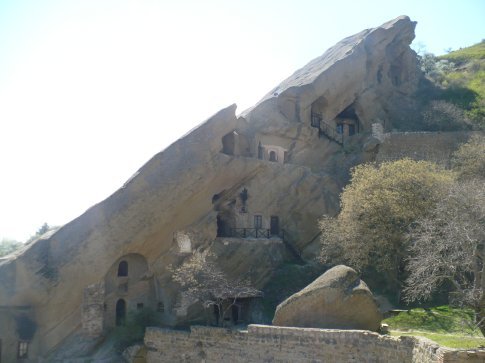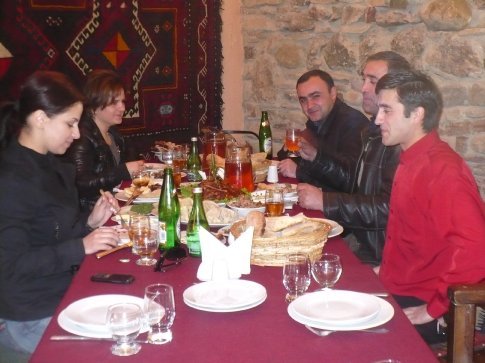April 10: Davit Gareja
I took a myriad of public transit options to get from Tbilisi to the village of Sagarejo, where I was joined by my first Ministry of Education contact – four, in fact, who didn't seem too bummed about taking the day off work to show off their local pride and joy: the Davit Gareja monastery. The monastery was established by Saints David and Dodo in the 6th century CE as Christianity spread throughout modern-day Georgia. The monastery itself is spread out over a few hills near the border with Azerbaijan. Over the centuries (and still today), the resident monks have lived in caves cut into the rock walls. It has not always been graced with its current peaceful aura, however.

The monastery was destroyed by the Mongols in the 13th century, rebuilt, and subsequently ransacked again by Timurlane in the 14th century. In 1615, Shah Abbas, a Persian king of the powerful Safavid empire, slaughtered 6000 monks praying by candlelit on Easter night. During the Soviet era, the main monastery was used for military practice.
As my new friends and I were leaving the monastery, one of the women asked me if I was wearing a cross. I answered in the negative, to which she responded with a quick, “Why not?” I had to choose my words carefully to avoid offending my hosts, but the always-direct question of religious affiliation is something I’ve become decent at navigating, depending on my level of comfort and trust with the person who is asking.
I told her that I don’t have a cross because I’m not Christian, which is true. I also explained that I don’t subscribe to anything specific; I appreciate and respect small parts of many different religions, but there is no single one that I believe in. (I left out the minor details that I’m an atheist and that I think organized religion is the root of most of world’s ills, both past and present.) I thanked her for showing me around one of the most important religious sites in Georgia and for Christians around the world. Much like several mosques and mausoleums I marvelled at in Uzbekistan, Davit Gareja is considered to be so sacred that three visits to its monasteries is equivalent to a pilgrimage to Jerusalem.

Savouring Georgian hospitality in Sagarejo
Back in the nearby village of Sagarejo, we collected a terrifyingly huge jug of homemade organic wine from one of their colleagues and settled in for an afternoon of feasting. Georgians take full advantage of the agricultural bounties bestowed upon them by their favourable climate and the foods they have produced are nothing short of drool-inducing. I had already been filling my face with khachipuris (molten cheese pies) since my arrival in Tbilisi a couple days prior, but had yet to experience the full range of delicacies.

Among the seemingly constant flow of different dishes proudly presented to us (we were the only ones in the cavernous restaurant) were fresh salads and cheeses, pkhali (garlic, spinach, and herb spread), khachipuri (bliss), badrijani nigzvit (grilled eggplant with walnut paste), mtsvadi (pork shashlik), and khinkali (meat dumplings). In spite of my train-bound hope of being vegetarian for a couple weeks, the main dishes were indeed meat-based and my hosts insisted that I try them (“It’s not a Georgian meal without them!”). I was, however, thankfully able to politely decline a bowl of a mystery soup with a lot of sheep fat and what looked suspiciously like innards. Thanks, but no thanks; I’m quite ‘over’ that type of food now that I have other options!
The wine was perhaps the part of the meal most steeped in tradition. Every family in Georgia has its own homemade recipe which is passed down through the men in the lineage, and each of course believes his is the best in the country. Though the wine we had was technically a white, it looked more like apple juice (though packed QUITE a punch!). Here, they ferment the grape juice directly on the grape skin, a technique usually used only for red wine production. At a gathering, there is always a tamada (toastmaster) who toasts fairly often and at great length. The others at the table are not allowed to drink ‘outside’ of a toast, but MUST drink when a tamada does! Also, if you (the guest) are toasted, you are supposed to respond either with a simple ‘thank you’ and repetition of the tamada’s words, or even better, with an elaboration (but not too much – you don’t want to show up the tamada!). Among the topics of my tamada were Georgia (which is pretty much always the first), Georgia’s traditions, peace, friendship, mothers, fathers, families in general, and friends killed in Abkhazia in the 2008 war…
Guests are incredibly important to Georgians, almost to an extreme degree. One man said to me, “Even if you killed my brother, you would still be my guest.” WOW. I don’t know if that would fly anywhere else in the world. Though I don't plan on testing the validity of that statement anytime soon, I sure do love their hospitality and food traditions...!
